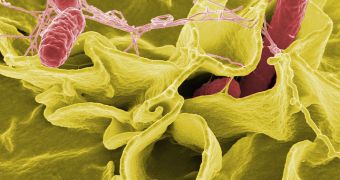Biologists say that the Salmonella enteritidis can infect chicken eggs in multiple ways, facilitating the outbreak of infections in the general population.
While it may seem impossible for the microorganisms to penetrate egg shells, there are actually more ways than one in which this can be achieved, LiveScience reports.
The most common transmission methods can however be blocked via preemptive action, such as decontaminating the sites were chickens are grown, or checking them periodically for signs of bacterial infections.
Fecal matter is one way to contaminate eggs. If the products come in contact with feces from contaminated humans or hens, then they become infected as well, and carry the bacteria to the market.
Another method the organism uses to contaminate new eggs is by lodging itself into the ovaries of hens. They can enter the newly-formed egg even before the shell itself is produced, LiveScience reports.
Biologists and public health officials are aware that the second case can have the most devastating consequences, and cause outbreaks very easily, and so they are forcing companies to conduct periodic check-ups of the hens they are managing.
According to official statistics in the United States, only very small numbers of hens are contaminated with salmonella at any given time. However, the bacteria are remarkably persistent, and can't apparently be eradicated altogether.
“The best thing for consumers to do is to pay attention to the brand of eggs that are being recalled, and to return any eggs that they've purchased of that brand to the store,” says Rob Gravani for Life's Little Mysteries.
He is a professor of food science at the Cornell University, in Ithaca, New York. The expert is talking about the recent Wright Country Eggs recall, which affected numerous stores in the United States.
The Centers for Disease Control and Prevention (CDC) advises the general population that salmonella infections are extremely dangerous for the human body.
In the first stage, the bacterial agent affects the intestines, but it can then move into the bloodstream, as well as into other parts of the body.
In the end, if not properly addressed with antibiotics, the condition can become fatal. Children, the elderly, and people with weaken immune systems are naturally the most likely victims.

 14 DAY TRIAL //
14 DAY TRIAL //